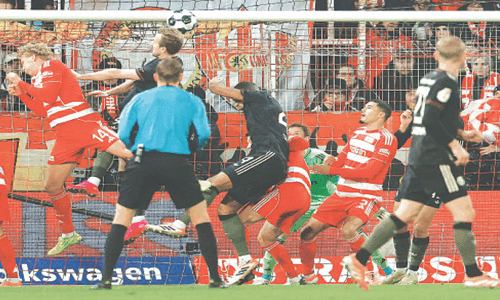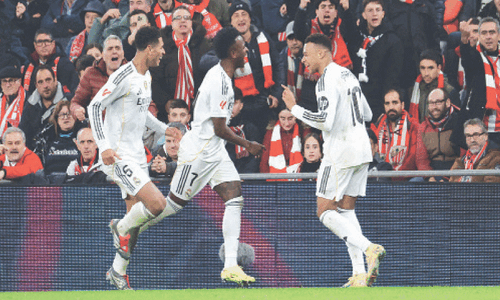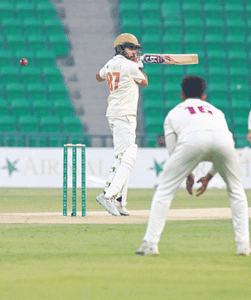LAHORE: Since its inception in 1953, the Quaid-e-Azam Trophy has produced some of the most epic battles in the history of first-class cricket. The sensational individual and team records have made headlines regularly.
The highs and the lows
The highest team score belongs to Sindh, who amassed 951 for seven against Balochistan in the 1973-74 season. The total included 428 by Aftab Baloch, which is the second-highest score in Pakistan’s first-class history behind Hanif Mohammad’s epic 499.
Karachi Blues are the other side to have the honour of posting an 800-run plus total (802 for eight).
National Bank have the lowest total in the country’s first-class history (20), but the Quaid-e-Azam Trophy’s undesired record is held by Dhaka University and Education Board who were dismissed for 29 against Dhaka in the 1964-65 edition.
Rawalpindi pacer Naeem Akhtar holds the record for the best bowling figures in tournament’s history. He took 10 wickets for 28 runs against Peshawar in the 1995-96 edition.
Left-armer Shahid Mehmood, with figures of 10 for 58, was the first Pakistan bowler to take all ten wickets in an innings when he secured the feat in 1969-70 season. The other three bowlers to have picked up 10 wickets in an innings are: Imran Adil (10 for 92 in 1989-90), Naeem Akhtar (10 for 28 in 1995-96) and Zulfiqar Babar (10 for 143 in 2009-10).
Rawalpindi’s Saad Altaf holds the record for best bowling figures in a match. The left-armer took eight wickets in each innings to return 16 for 141 in a 2017-18 edition match against Fata.
Test fast-bowler Sohail Khan has also taken 16 wickets in a match.
Aamir Wasim, Abdur Rauf, Fazal-e-Akbar and Taj Wali have taken two hat-tricks each.
Zohaib Shera holds the record for a hat-trick on first-class debut. He achieved the feat in the 2009-10 edition.
Karachi and Lahore at centre stage
It was in the ‘90s that Karachi and Lahore emerged as the forces to reckon with in Pakistan cricket. The two cities competed in the title match on five occasions in the seasons from 1990-91 till 2000-01.
Lahore (City and Blues) took the honours thrice, while Karachi’s two sides (Blues and Whites) won two finals.
The two cities faced-off in a final for the first time in the 1959-60 edition, with Karachi turning out victorious.
Interesting facts (final matches)
On four occasions, Quaid-e-Azam Trophy final was not held. The teams which accumulated the most points were declared winners.
Karachi’s National Stadium holds the honour of hosting as many as 29 finals. Overall, 32 finals have been held in the port city.
The Gaddafi Stadium in Lahore has held 14 finals, while a total of 17 final matches have been played in Lahore.
Nine finals have been won by innings margin. Punjab ‘A’ recorded the biggest win in the tournament history when they won the 1974-75 final against Sindh ‘A’ by an innings and 248 runs.
Six teams have won the final by more than 200 runs. National Bank recorded a 384-run win against Habib Bank in the 1978-79 edition.
In the 1994-95 final, Karachi Blues posted 802 for eight declared in the final against Lahore City, the lowest score in the first innings of a final match was registered by Faisalabad who scored 111 against Sialkot in the 2005-06 edition. In the 2009-10 final, Habib Bank were rolled over for a mere 66 runs while chasing 208 runs for victory against Karachi Blues.
In the 1978-79 final, Habib Bank were dismissed for under 100 totals in both innings.
Seven batsmen have the honour of scoring a double-century in the final. The list includes: Imtiaz Ahmed (251), Majid Khan (213), Asif Mujtaba (208), Mahmood Hamid (208), Yasir Hameed (207), Mohammad Rizwan (224) and Imam-ul-Haq (200 not out).
Moin Khan (200 not out) and Babar Azam (266) scored double-centuries in the final of Quaid-e-Azam Trophy Silver League.
Bilawal Bhatti (8 for 56) holds the record of the best bowling figures in a final match, while, Abdul Wahab, Aftab Baloch, Ehtishamuddin and Samiullah Niazi have also taken eight wickets each in a final.
In the Silver League final, Yasir Arafat’s nine for 108 is the best bowling performance. Test all-rounder Abdur Razzaq took seven wickets for 51 runs in his first-class debut, which happened to be in the 1996-97 tournament final.
Successful captains
Khan Mohammad was the first successful captain in the Quaid-e-Azam Trophy history as he led Bahawalpur to win in the inaugural edition.
Khan’s Bahwalpur teammate of Pakistan’s inaugural Test, Hanif Mohammad is the most successful captain in tournament’s history, having lifted the trophy four times.
Former Pakistan captain Moin Khan led Karachi Whites and PIA to the title in separate seasons, while, Moin also led Karachi Harbour to the Silver League title.
Asif Mujtaba, who like Hanif and Moin also hailed from Karachi, lifted the trophy three times as captain, while Wazir Mohammad, Waqar Hasan, Arif Butt, Shafiq Ahmed, Ijaz Faqih, Rashid Khan, Misbah-ul-Haq, Hasan Raza and Mohammad Hafeez have all lifted the trophy two times.
Among the provinces, Sindh have won three while Punjab have won two titles.
Published in Dawn, September 13th, 2019


































